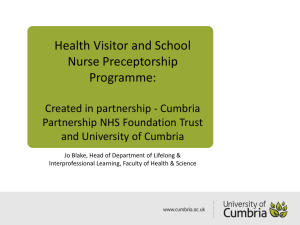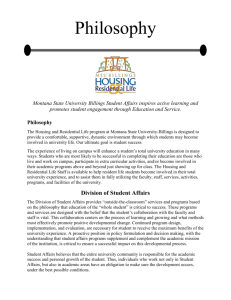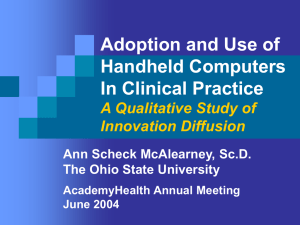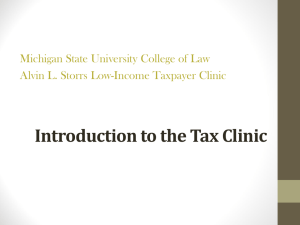Addressing the Social Determinants of Health of Low
advertisement
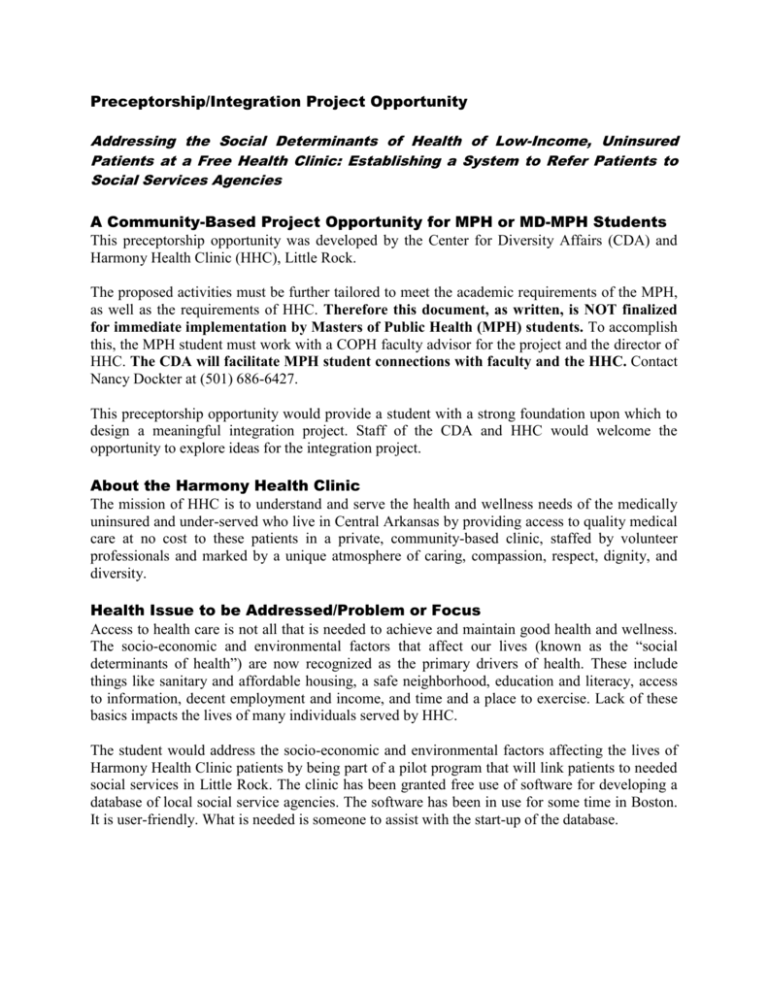
Preceptorship/Integration Project Opportunity Addressing the Social Determinants of Health of Low-Income, Uninsured Patients at a Free Health Clinic: Establishing a System to Refer Patients to Social Services Agencies A Community-Based Project Opportunity for MPH or MD-MPH Students This preceptorship opportunity was developed by the Center for Diversity Affairs (CDA) and Harmony Health Clinic (HHC), Little Rock. The proposed activities must be further tailored to meet the academic requirements of the MPH, as well as the requirements of HHC. Therefore this document, as written, is NOT finalized for immediate implementation by Masters of Public Health (MPH) students. To accomplish this, the MPH student must work with a COPH faculty advisor for the project and the director of HHC. The CDA will facilitate MPH student connections with faculty and the HHC. Contact Nancy Dockter at (501) 686-6427. This preceptorship opportunity would provide a student with a strong foundation upon which to design a meaningful integration project. Staff of the CDA and HHC would welcome the opportunity to explore ideas for the integration project. About the Harmony Health Clinic The mission of HHC is to understand and serve the health and wellness needs of the medically uninsured and under-served who live in Central Arkansas by providing access to quality medical care at no cost to these patients in a private, community-based clinic, staffed by volunteer professionals and marked by a unique atmosphere of caring, compassion, respect, dignity, and diversity. Health Issue to be Addressed/Problem or Focus Access to health care is not all that is needed to achieve and maintain good health and wellness. The socio-economic and environmental factors that affect our lives (known as the “social determinants of health”) are now recognized as the primary drivers of health. These include things like sanitary and affordable housing, a safe neighborhood, education and literacy, access to information, decent employment and income, and time and a place to exercise. Lack of these basics impacts the lives of many individuals served by HHC. The student would address the socio-economic and environmental factors affecting the lives of Harmony Health Clinic patients by being part of a pilot program that will link patients to needed social services in Little Rock. The clinic has been granted free use of software for developing a database of local social service agencies. The software has been in use for some time in Boston. It is user-friendly. What is needed is someone to assist with the start-up of the database. Overarching Goals of the Preceptorship The primary goal of the preceptorship is to help HHC patients better address socio-economic conditions of their lives that negatively affect their health and wellbeing, through the launch of a social services database and development of procedures for patient referrals and follow-up, as well as evaluation of the referral program. Learning Objectives Through this project the student would gain knowledge and skills pertaining to Health issues and priorities for low income, uninsured patients Local social services that can improve the health and wellness of low-income, uninsured patients Engagement with social service providers Communication skills with low-income, uninsured patients Development of procedures and processes for data collection for a public health program Activities for the Preceptorship To fulfill the 200-hour requirement for the preceptorship, students must complete required activities and then select from optional activities. All activities would be completed with supervision and guidance from Ron Bara, MA, director of the medical clinic at HHC, as well as Nancy Dockter, MPH, diversity process coordinator for the Center for Diversity Affairs. The student will also work under the direction of the senior UAMS medical students were instrumental in bringing HelpSteps to HHC and thus are most knowledgeable about the program. Establish regular meetings with preceptors to discuss activities and progress. Complete training in the HelpSteps database. Assist with start-up of the HelpSteps database: o contact Little Rock social service agencies to verify what services they provide and other pertinent information; input that information into the database o develop a set of procedures and processes for use of the database and making patient referrals to social service agencies, specifically for determination of a patient’s needs for social services making appropriate patient referrals to social service agencies follow-up on referrals and data collection that will enable monitoring of outcomes and evaluation of the referral program o beta test the HelpSteps database and system with HHC patients (if time permits).
